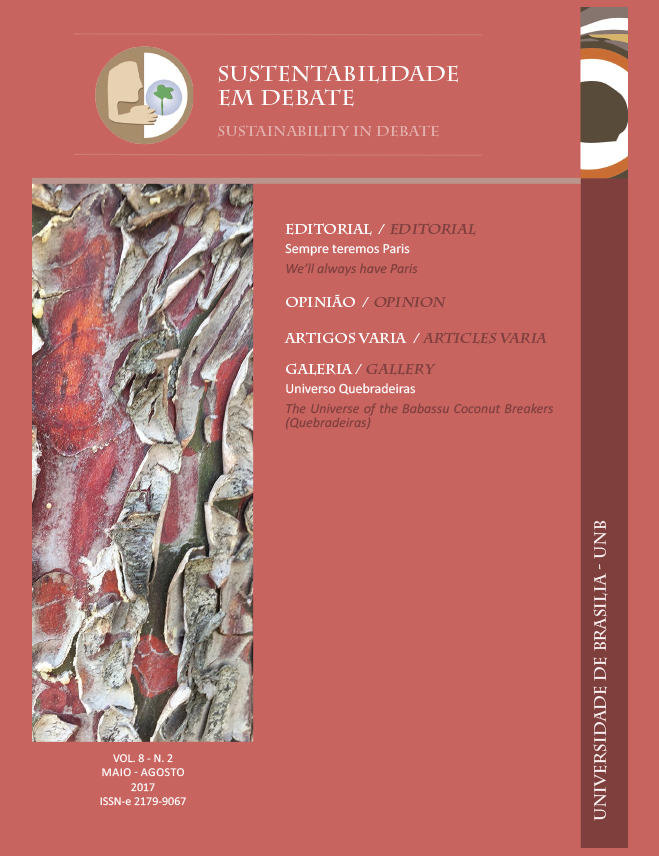Feasibility Study of Reusing Tarp Banners in the Furniture Production
DOI:
https://doi.org/10.18472/SustDeb.v8n2.2017.24730Keywords:
Ecodesign, Reutilização, Banners de Lona, MobiliárioAbstract
Vinyl tarp is a low-budget material with good print quality, being widely used for making banners for
advertising campaigns and academic events. In both applications, it quickly turns into waste. In this
context, a research project was designed with the objective of studying the feasibility of reusing tarp
banners in the furniture production. The project was developed with students of the Technical Course
in Furniture of the Federal Institute Farroupilha (IFFar), Santa Rosa Campus. In the first stage, tests on
cutting, joining, finishing and deforming were performed. The cutting of the material was considered
feasible. The bonding with adhesives was unsatisfactory, with best results with mechanical bonding
with metallic clips. Regarding the finish, paints were not able to cover homogeneously the surface. As
for the resistance, the vinyl tarp underwent plastic deformation with the application of localized load.
With restrictions, use of the material for production of furniture was considered viable. In the second
stage, the design and prototype of column luminaires, coffee tables, folding benches and stackable
niches were developed. The design of products prioritized the reuse and rational use of raw materials, a
simplified production process and a contemporary aesthetic, consistent with the precepts of Ecodesign
and economic viability.
Downloads
References
CASSILHA, Antônio Carlos et al. Indústria moveleira e resíduos sólidos: considerações para o equilíbrio ambiental. Educação & Tecnologia: CEFETs PR/MG/RJ, 2003.
D'AVILA, Fernanda; LENZI, Teresa. Re-utilizar para educar e minimizar problemas socioculturais. In: 13ª Mostra da Produção Universitária. Rio Grande, 2014.
FUAD-LUKE, Alastair. The eco-design handbook: a complete sourcebook for the home and office. London: Thames & Hudson, 2004.
GOMES, Daniel D.T. de C. O r em Design: a reutilização aplicada ao design. 2011. 104 p. Dissertação (Mestrado em Design Industrial). Faculdade de Engenharia, Universidade do Porto, Portugal, 2011.
HERMES, Letícia; MORGENSTERN, Elenir C. Ecobanner: Reaproveitamento sustentável de lonas vinílicas. Blucher Design Proceedings, Belo Horizonte, v. 9, n. 2, 2016.
JUNG, Aliar A.; SALDANHA, Mateus A.; GONÇALVES, Juliana A.; TOCCHETTO, Marta R.L.; DIC, Carmem. Projeto Relona: Reaproveitamento de lonas de banner. In: 4º Fórum Internacional Ecoinovar, Santa Maria, 2015.
KAZAZIAN, Thierry (org.). Haverá a idade das coisas leves: design e desenvolvimento sustentável. 2 ed. São Paulo: Senac, 2005.
KINDLEIN JÚNIOR, Wilson et al. Princípios básicos de junção utilizados em sistemas e subsistemas de produtos industriais e sua importância no desenvolvimento sustentável. In: Associação Nacional de Pós-Graduação e Pesquisa em Ambiente e Sociedade, 1., 2002, Campinas. Anais. São Paulo, 2002. CD-ROOM.
LÖBACH, Bernd. Design Industrial: Bases para a configuração dos produtos industriais. São Paulo: Edgard Blücher, 2001.
MARTINUSSI, Júlia C.; ROSA, Rodrigo P.; GOYA, Cláudio R. Projeto Kid Vinil: um estudo de caso para a reutilização de resíduos de lona vinílica. In: 9º Congresso Brasileiro de Pesquisa e Desenvolvimento em Design. São Paulo, 2010.
PADILHA, Ângelo Fernando. Materiais de engenharia: microestrutura e propriedades. Curitiba: Hemus, 2000.
PIGOSSO, Daniela C.A.; ZANETTE, Evelyn T.; GUELERE FILHO, Américo; OMETTO, Aldo R.; ROZENFELD, Henrique. Ecodesign methods focused on remanufacturing. Journal of Cleaner Production, n. 18, p. 21-31, 2010.
PLATCHECK, E. R.; SCHAEFFER, L.; KINDLEIN JR., W.; CÂNDIDO, L. H. A. EcoDesign: case of a mini-compressor re-design. Journal of Cleaner Production, p. 1-10, 2007.
SHELDRICK, Leila; RAHIMIFARD, Shahin. Evolution in Ecodesign and Sustainable Design Methodologies. 20th CIRP International Conference on Life Cycle Engineering, Singapore, 2013.
Downloads
Published
How to Cite
Issue
Section
License
SUSTAINABILITY IN DEBATE – Copyright Statement
The submission of original scientific work(s) by the authors, as the copyright holders of the text(s) sent to the journal, under the terms of Law 9.610/98, implies in the concession of copyrights of printed and/or digital publication to the Sustainability in Debate Journal of the article(s) approved for publication purposes, in a single issue of the journal. Furthermore, approved scientific work(s) will be released without any charge, or any kind of copyright reimbursement, through the journal’s website, for reading, printing and/or downloading of the text file, from the date of acceptance for publication purposes. Therefore, the authors, when submitting the article (s) to the journal, and gratuitous assignment of copyrights related to the submitted scientific work, are fully aware that they will not be remunerated for the publication of the article(s) in the journal.
The Sustainability in Debate Journal is licensed under Creative Commons License – Non-Commercial-No-Derivation Attribution (Derivative Work Ban) 3.0 Brazil, aiming at dissemination of scientific knowledge, as indicated on the journal's website, which allows the text to be shared, and be recognized in regards to its authorship and original publication in this journal.
Authors are allowed to sign additional contracts separately, for non-exclusive distribution of the works published in the Sustainability in Debate Journal (for example, in a book chapter), provided that it is expressed the texts were originally published in this journal. Authors are allowed and encouraged to publish and distribute their text online, following publication in Sustainability in Debate (e.g. in institutional repositories or their personal pages). The authors expressly agree to the terms of this Copyright Statement, which will be applied following the submission and publishing by this journal.






